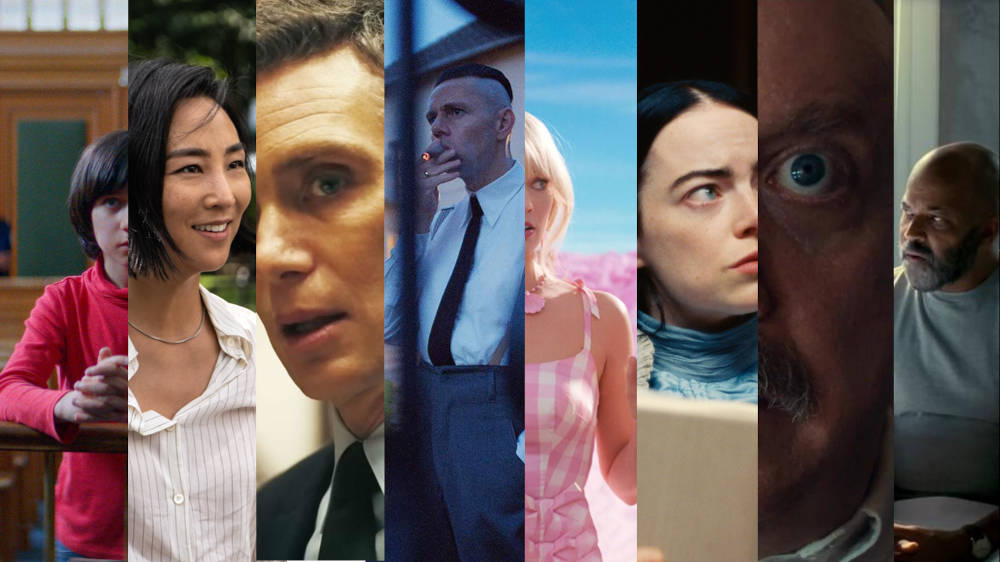After a rumpy nine years, where I struggle to find enough time to watch all the Oscar Nominated films and write my predictions, last year, I managed to get 15 out of the attempted 19 predictions right. But it was easier last year. Everything, Everywhere, All at Once was a movie of our time, moving the industry in a different direction. Predict that they win everything, and you’re right all at once.
This year is different. First, very few of the movies are movies of the present day. A lot of them could well have been made in the 1980s. The closest filmmaker we get stylistically to Poor Things is Tarsem Singh, who was active nearly 20 years ago. From the point of view of films that could only be made in the 2020s, only American Fiction and Barbie qualify.
Despite the writers’ strike and a diffident global economy, high-brow movies have come back with a retributive wrath, polarizing audiences with the inscrutable question: between Barbie and Oppenheimer, which had the more exquisite cheekbones?
In previous years, we’ve had dud films on the list like the hastily-constructed Vice, or the plot-fumbly Nightmare Alley, but the nominees this year deserve to be in there. So, if our sleeves are rolled up, and your high heels are laced, let’s get into it.
Best Picture
Personally, I would have booted Maestro off this list. Not because it was boring (which it is), but because it is aimless. The film is a biopic of American virtuoso composer and conductor Leonard Bernstein. Unfortunately, writer-director-starrer Bradley Cooper found the quote where Bernstein said “life was like a badly written drama”, and decided to oblige.

[Maestro]
It’s a sadly self-indulgent film, tasting more of Oscar Bait than anything else. I appreciate the super long cuts that allow actors to shine, but that is also because Cooper is not skilled enough to know when to pull back. It needed a defter scriptwriter, who could focus on Bernstein’s actual intellectual charisma (of which the film had none) and musical adroitness (of which there was none of substance). Especially since Tar had plenty of both and came out just last year. It was Carey Mulligan who carried this movie, and if we did pivot to show how Felicity Bernstein met Leonard, discovered his idiosyncrasies, realized she was more driven to have him as her project than her career in the movies, and gave it all up only to be ultimately betrayed, not in sexuality but in friendship, that would have made a compelling, engaging movie, and you could have kept 80% of the scenes shot too.
Second last I would place Killers of the Flower Moon, the first of a few films on this list that redeems itself in the last 5 minutes. It’s about white conmen who barbarously exploit oil-rich Native Americans, through marriage, mendacity and manslaughter. It’s an upsetting true story of a crime so indelicately committed, at such a huge scale, it’s frustrating that the Native American community never stopped to ask themselves how. (If you look really hard, you’ll find an equally tactless joke in the previous sentence, which is my crime against the Native American community.)
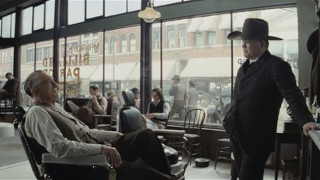
[Killers of the Flower Moon]
I think this movie should have been shorter by 45 minutes. It also suffers because it has giant actors who are white, and novice actors who are Native American. Many of them struggle through the language, Osage, and are trying to play American accents from a specific place in America, when in actuality they grew up all over the States. But for whatever reason (whether they are a physical people, or because they were all first time working for Martin Scorsese), this film has the most masterful blocking (placement of people on the screen) of any film this year. Compare scenes with a lot of people (barbershop, doctor’s office, huge crowds at the station) with scenes in Barbie (where everyone stands in a row), or perhaps the science debates in Oppenheimer (where the blocking from an otherwise reliable director is missed a jarring number of times). Most of Scorsese’s frames are composed like paintings and most of the edits, caringly constructed.
I’m also not sure that Leonardo DiCaprio hits his mark in this film. He needs to be a desperate washed-out man, a person who’s agreed to walk a path to betrayal, only to find out that he’s fallen in love with the person he’s meant to betray. Whether it’s DiCaprio or Lily Gladstone, or the chemistry between them that has led to this miss, I do not know. But the film would have been more powerful if you felt DiCaprio and Gladstone were a couple in love.
Third last, I’ll place underwhelmingly unexplosive Oppenheimer. The film is a biopic of Robert Oppenheimer, the bloke responsible for creating the Atom Bomb. I hope gentle reader, you will forgive me for taking the otherwise great Christopher Nolan to task (Dunkirk remains sublime). But here he’s bootlaced up by limitations he’s placed on himself, which are (1) IMAX and (2) Special Effects. Let me explain.
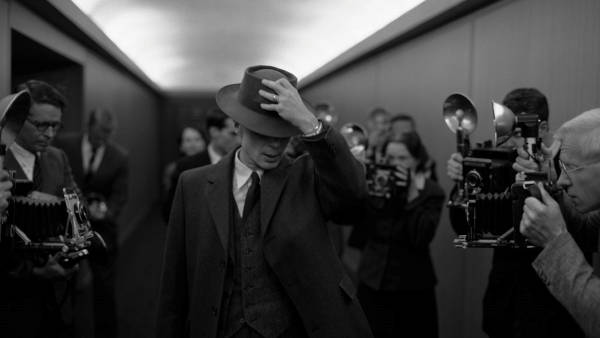
[Oppenheimer]
IMAX is a hazardously limiting medium. I’m not an expert, but the internet says an IMAX camera holds a three-minute spool, and it takes 20 minutes to reload. That’s 20 minutes for impatient actors like Robert Downey Jr to hang around while resetting or emotive scenes from Cillian Murphy to be held on pause. It also means you don’t get a whole bunch of takes. And while I think the actors were prepared, and certain shots envelopingly excellent, there are dollop loads of talkie shots, where the camera departments were unequal to the task. Sloppy unmotivated camera movements abound in this film. Shots where the focus was clearly meant to be elsewhere haunt it. Possibly they weren’t allowed more than a few takes per scene. Possibly, they just didn’t get the cameras to rehearse with. Whatever the reason, scenes where scientists talk to one another stink like H2S and leak all over a great film like an untightenable burette. And all of this is up on the largest possible of screens, right next to films by Martin Scorsese and Jonathan Glazer for us to scrutinize.
And then we have Special Effects. And while Nolan spends much of his planning time, and a lot of build up to one large effect, because he’s not using computer animation and because he can’t actually blow up something devastatingly large, the scale of the explosion is simply absent. The buildup is clever (if unoriginal) and there’s compelling use of sound, but the underwhelming whimpering explosion was what the entire IMAX experience was for. I don’t think people came away from the audience remembering that shot, whereas everyone came away from Interstellar remembering the Blackhole depicted in a way we’ve never seen before.
For contrast here’s the same event, but this time memorably rendered in CG by David Lynch.
Nolan also should have hired a zingier writer (imagine if it had an Aaron Sorkin ring to the dialogue), so that everyone sounded smart. He should have relented from IMAX only and he should have made a smaller film, and not made a hype about the explosion. Contrast this dialogue with that of a tight little film called Copenhagen (Daniel Craig, playing Heisenberg, visiting Niels Bohr to debate if he should put a spanner in the development of the Atom Bomb) which has all the moral quandary from the German side, but none of the nonsense. Nolan, lacking the Nolan tricks, which has to do with time and audience expectation, is not Nolan at all.
Seventh from the top I’ll place The Zone of Interest. It’s a chilling film about the Hoss family, where father Rudolph is the commandant of Auschwitz, and where the family go about their lives despite the concentration camp looming in their backyard. It’s a gut punch of a film, and very study-able. The director, Jonathan Glazer, knows precisely what he’s doing; but it’s also the kind of film that gives Oscar nominated films a bad name and makes Oscar film audiences dwindle. It relies on you knowing a great deal about history, not just about Auschwitz, but also the name of the person who ran it, probably also the fact that he was executed for his crimes, and the fact that there was a woman who stashed fruit around the work areas for Jews to find at night. Thus, this is a film that will hit you hard, only if you’ve actually gone on a tour of a concentration camp, or been to a Holocaust museum. It requires you to bring the emotion (especially the horror) to the film, and it demands you to bring the requisite attentiveness. I will admit though, I don’t think I have seen many films in recent years that proffer the audience this much respect.
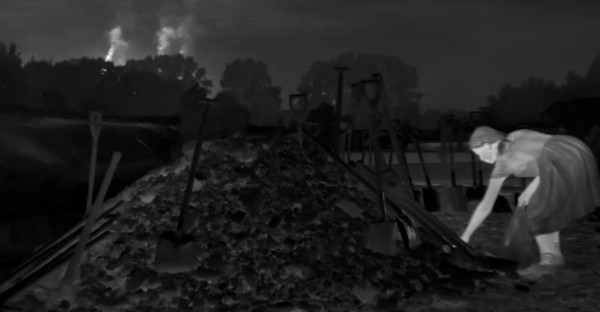
[The Zone of Interest]
Two things I will compliment. One, Glazer’s strong directorial vision is unmatched. He sets up mise-en-scene perfectly. He’s always keeping the camera quite distant, so we’re always uneasy (and can never empathise). He’s set up the geography of the house perfectly, and through carefully choreographed movements, gets the audience used to his strange cuts to a camera placement that’s almost always exactly 90 degrees away. There are reasons why this is not usually done in film, but I’m going to avoid explaining that to the non-filmmakers who may be reading this. In case you are a filmmaker or film student, I’m just going to say “Ozu” and “180 degree rule”, and hope you get it.
The second thing I will compliment is that he doesn’t let us empathise with the subjects of his film and doesn’t showcase any of the atrocities for the sake of wringing our emotions (possibly because either would find accusations from an irate public). That’s a very fine balance, and he does it well. I’ve never seen a film where such a high percentage of crucial stuff is mostly shown through the actors’ back being to the audience. Also, this is the second film in our list whose brilliance is in the last 5 minutes of the movie.
The other aspect is the contextualization. There are two major wars going on at the moment, not to mention conflicts in India that are perhaps less known on the global stage. Yet Instagram and TikTok remember them only sporadically. In a way, a lot of us are like the children in the film, trying to carve out normalcy while death and devastation goes on in our backyard. It’s probably the best film this year that I will advise you not to watch, and there are murmurings that it will win the Oscar, but I think its esoteric nature will keep that from it.
Sixth from the top is a remarkably joyous Christmas movie, The Holdovers. A curmudgeonly teacher, a recently bereft cook and an entitled (in that he feels he’s been wronged) student, find themselves stuck with each other for Christmas in a boarding school. The film is soft, fluffy, with just a tinge of pain (it’s beginning to look a lot like Christmas parties). The Holdovers is a three-hander, where each character is in some way creating a mask of themselves which they project. Circumstances arise to crack their mask just enough to let others in. Even if you’re not an Oscar film watching type, I think you should watch this film, because it’s heart-melting, funny, and as emotively oscillatory as a rum-soaked fruitcake.
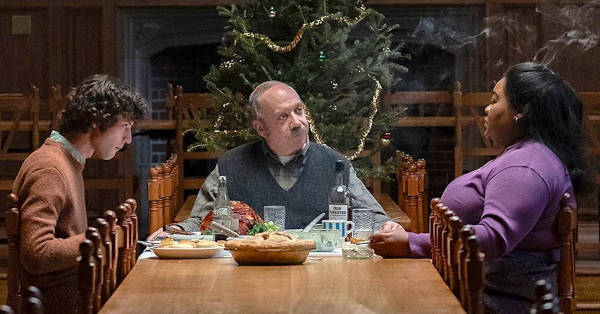
[The Holdovers]
It does not break new ground. The main draw of The Holdovers is that it is a throwback to a time when Hollywood made Breakfast Club and Dead Poets Society. Though actors Paul Giamatti and Da’Vine Joy Randolph extract a lot from their roles, and it certainly should be watched by a wider audience, it’s not going to take home the big prize.
Fifth from the top is everyone’s favourite problematic feminist icon, Barbie. It’s a film about the Barbie-doll universe told through the eyes of someone who watched Neverending Story in their childhood. Barbie is a culturally important film. What initially appears to be a plastique pastiche is a commentary on feminism, capitalism and a way to positivise the role of masculinity in a world closing down on masculinity. What I particularly appreciate is that it’s probably preaching, at least in part, to the unconverted (I imagine the women in the American red states watching this film).

[Barbie]
I like the film because it wasn’t gunning for Oscars. It was gunning for a four-quadrant audience, which by itself is audacious for a film called Barbie. And it succeeded. It made some bold artistic choices, poked fun at the makers at Mattel, dealt head-on with all the problems that Barbie has naturally in-baked, and resolves most of them. It even has a compelling arc for an otherwise sidelined Ken. The film is meta-modernist — this is a new form, after post-modernism, which films like Everything Everywhere All at Once, and Spiderman Across the Spiderverse are also a part of.
But it’s also true that though it was a difficult film to get made (Gerwig often says she got her ideas through because she drives it like a car she stole), it’s not Oscar material. Some scripting short-cuts can be pointed out (like America Ferrera’s on-the-nose direct-to-camera monologue). However, I can’t blame the film for this, because some of the audience members might be 12 years old, and I think it’s lovely that the film can also cater to them. But I believe the most egregious error was Margot Robbie casting Margot Robbie instead of the other contender, Anne Hathaway. I mean, she should do what she wants, Robbie produced the movie. But as an actress, she played the plastic well, but didn’t have the emotive heft to do non-plastic as well. Remember this is a Barbie that is supposedly breaking away from her Barbieness because she’s having thoughts about death. (What are you saying Ronaan, that Anne can have more convincing thoughts about death than Margot? — yes that’s what I’m saying.) Thus, Ken’s arc hits us harder than Barbie’s arc, whereas Barbie’s arc (as narrator Helen Mirren points out in the film) should have been where the point needed to be made.
The beautiful Past Lives comes next. It’s a tender story of a woman who emigrated to America from Korea as a teen, and many years later gets a visit from a boy she dated in Korea. She then gets to reconnect with a “what could have been” life versus her own. It’s elevated in both joy and profundity by the captivating lead Greta Lee. It has some stunning dialogue, with sections in Korean being very Korean and sections in American being very American. Masterfully, and this perhaps is owing to the bi-lingual script-writer, the main character Nora seems like she thinks differently, and therefore is different in Korean and in English, which is the central point of the film, and must be relatable to anyone who speaks two languages.
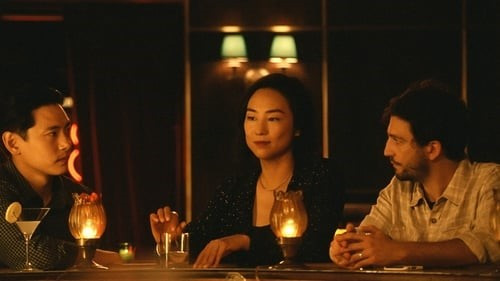
[Past Lives]
I guess this film suffers from the fact that writer/director/producer Celine Song is a newbie to the industry. I think she should get every kudos for achieving what she has, but you can see from the budget, and the lack of input that she must have gotten, that she was unable to surround herself with the best, and the best could have elevated this film a lot more. She also needed a little bit more meat in the film, and had the lead not been as captivating an actress as Greta Lee, the film length would have overstayed its welcome.
Third from the top is another must-watch, American Fiction. It’s classy and sardonic, wacky and serious, academic and disjunct, and brings all the meta-textuality expected from a modern piece. The protagonist is a professor and author, whose loving, but hating, but dysfunctional, but concerned family leads to him needing money. Meanwhile, his publishers say his novels are not “black” enough, which leads him to do something about it. In direct contrast to Past Lives this film chooses not to be about just one thing (black people being asked to be more authentically black), but about several things, and that one thing becomes the core theme. Thus, it feels like it has plenty of meat to it.

[American Fiction]
I love the film because it is a film that is meta-textual, mentions “Oscar-bait”, and proceeds to put black characters on a jury, specifically because the authorities say they need representation, and then proceed not to listen to the black characters at all. Maybe this film was nominated for the Oscars because it was black representative, but maybe that’s a great reason for this film to be nominated.
Jeffrey Wright is so perfectly cast in this movie. He’s got such a great sense of timing and rhythm that one often forgets he’s a fantastic physical actor as well. Like all the best actors, you can see straight into his mind at his frustrations, and this film benefits greatly from that. There’s a bit of a fumble at the end of the film, and the director/writer admits that the ending came out of the company not liking the original ending of the film. The ending is a brilliant solution, but it’s evident that it’s a replacement, which may be the reason that this film isn’t getting the highest accolade.
Which brings us to the top two choices, and I honestly don’t know who is going to get it.
So, at number two I’ll place Anatomy of a Fall. The film is about the death of a father through a fall, which has just enough of a not-quite-right feel about it, for the fuzz to suspect the only other person in the house, the mother. As an audience, we don’t know what we’re witnessing, an innocent woman whose imperfect personal life is being dragged through the court, or a guilty woman getting away with it. Add to this two stellar actors, a dog who has to act in one scene that would be challenging to several human actors, and a 14-year-old child actor who has to play sight-impaired.

[Anatomy of a Fall]
If one looked at the concept note, one would probably assume the film was going to be stylistic and Hitchcockian. Writer/Director Justine Triet swings in the other direction. The camera gropes about, for what it is meant to shoot, leading to a film that is the least cinematic of the bunch (and I think this excuse lets Justine get away with not having a great eye — something you can see in her other films, of which I’ve only watched the trailers). But because the camerawork is such, it feels (a) like a documentary, and thus closer to reality, (b) unlike a constructed narrative and (c) like we’re also groping around for the truth.
Another brilliant touch is that actress Sandra Huller plays a German who stands trial in France. So she’s either having trouble in French, or reverting to English, a language she is more comfortable in, but everyone else is not. Making her German is also brilliant for another reason. Sandra’s character also approaches many things rationally, as is stereotypical of her culture, yet the French Prosecutor is full of passion.
Unlike other courtroom dramas I can remember, the protagonist grapples with grief as well as fighting for her innocence. It suddenly has me wondering why other courtroom dramas don’t use grief more.
Stuck between all of this is the son, a key witness. His relationship with his mother is strained, not only by the death of his father, but due to a court monitor, whose job it is to be present when he is home to ensure the mother does not influence the son in any way that will affect court proceedings.
Another film that is elevated in the last 5 minutes, Anatomy of a Fall has few failings. I suppose apart from the camerawork there is one more cardinal one, which is that the first scene has to have loud music added later, but the actors do not speak in a way that loud music is playing. A small gripe that a more experienced hand would have caught. If it doesn’t win, it would be because the people who would vote for it would be split within many emotive films nominated this year.
Which leaves us with Poor Things. It’s a film that may not have won in other years, but here we have it. Emma Stone plays a reanimated woman who has the brain of a child. The world is fantastical and society has a prudish class system and patriarchal flair. Easiest to understand it as pseudo-Victorian.
The character, Bella Baxter, naturally is a lens through which we see holes in our society’s constructs. If sexual gratification is so delightful, why not have it all the time? If I have money and the poor does not, why not give all one’s money to the poor? In a more erudite manner, it hits all the same themes that Barbie does, with a more compelling lead actress.
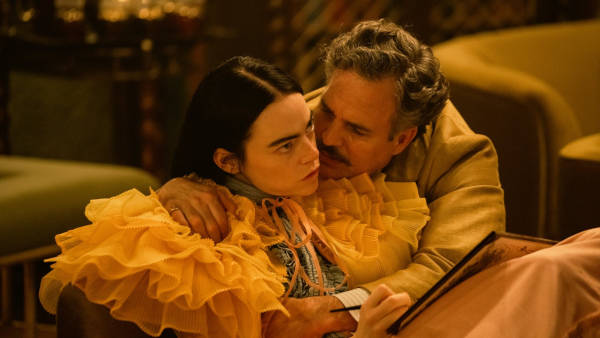
[Poor Things]
Because the protagonist has no context of societal rules, she acts as a mirror shining a light on society’s layered flaws. Why is whoring wrong? Why shouldn’t I say exactly what I feel? Why are people saying one thing, yet meaning another? If you have money, why would you not give it all to the suffering poor until you don’t? Why isn’t biting considered a tangible approach to conflict resolution?
Director Yorgos Lanthimos creates a phantasmagorical aesthetic, a world in which Willy Wonka’s recipes would be LSD laced. Depth of thought and flippancy of action are treated with equal weight. In an ornate setting, actors Emma Stone and Mark Ruffalo have a fluid visceral acting style. And the disconcerting out-of-tune music coupled with a sensory overload of colour makes this best picture material. I don’t think there’ll be many people who would say Poor Things was their favourite movie of all time, but this year, I see no reason not to vote for it.
Best Director
Apart from Justine Triet, everyone else on this list are masters of their craft, with their craft being on full display. The staging of scenes in Killers of the Flower Moon is just magnificent. Martin Scorsese achieves Kurosawa levels of blocking, and has some wonderful, unusual edits that don’t draw attention to themselves. Christopher Nolan uses music, lack of music, camera push ins to great effect. And one shouldn’t underestimate his ability to create a mood, especially wonder (I don’t think he gets enough credit for that). Yorgos Lanthimos has created an entire and particular world, and creates a space of comfort for an actress to express herself fully, without anything to hide behind. He’s no slouch with framing and subtext either.
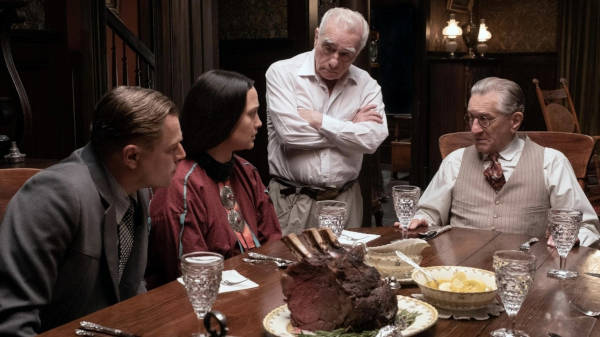
[Killers of the Flower Moon]
I think this Oscar is going to go to Jonathan Glazer (The Zone of Interest). There are many aspects of the film that are distinctly his, and distinctly a first. I don’t think I’ve ever seen a mainline film attempt to shoot night scenes using a heat camera. He quickly establishes this as normal. In so many instances you’re aware that you’re watching the family from afar, and thus impartially, and then abruptly he tells you with a transition that this is a director’s vision (and thus very much curated, and thus very much subjective). He restricts himself to certain geographies, for example, the house has a limited amount of camera frames, and the garden has exactly three frames. But to make this different at different times, in one instance he uses washing hung up to convey a different framing and sense of space than previously. As a director he’s so calculative, it seems hard not to hand him the main prize to take away.
Best Actor
It’s a tough year for best actor. Let’s deal with them in reverse order. Bradley Cooper in Maestro puts on a great impression, but doesn’t have the intelligent charisma to make Leonard Bernstein work. I unfortunately know Bernstein so well, that I can catch out Bradley’s accent slip-ups, especially on words like “haven’t”. And since he’s playing against Carey Mulligan whose accent work is so perfect, it doesn’t hold. Jeffrey Wright in American Fiction is simply amazing to watch. Mostly, when actors are showing their inner thoughts, they use their eyes. Wright manages to do this using his arms, his posture, his head movement. I’ve never seen him on stage, but if I had to study for the stage, playing an introvert, I would use him as a template. He’s not playing a character though, and this might be a reason he won’t get it (he’s mostly playing Jeffrey Wright, and let me tell you, playing yourself is no easy feat).

[Jeffrey Wright in American Fiction]
Next, I would put Paul Giamatti in The Holdovers. He’s a mammoth actor, with immense skill. He doesn’t get the scene that he needs, to break down, thus steal away the Oscar. Aside from that, it’s a very particular character, who has a separate “put on version”, which he uses most of the time, even when alone, and a separate “real version”, which one barely gets to see. More than the acting, what created circumstances created this character, is something Giamatti has clearly put a lot of work into, and it is this that’s on full display. Any other year, Giamatti might have taken this home. But this year is a crowded one.
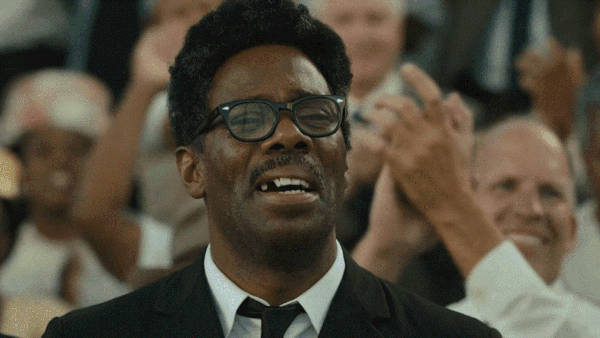
[Colman Domingo in Rustin]
Colman Domingo had never come across my radar before. He had a very unique challenge in front of him. He plays the titular character in Rustin, an important figure in the black civil rights movement that gets swept from the annals of history. Now, he can’t play Bayard Rustin as Bayard Rustin, because Bayard Rustin is too much of a character. Rustin was loudly gay, in a way that is too sitcomish today to put on a screen. He also owned an accent that is all over the map, sounding extremely British in some recordings and more American in others. So Domingo creates his own, extremely particular character, unlike anyone else on film, but also unlike the original. He needs to be charismatic enough to magnetise hundreds of thousands of people, flamboyant enough to be repulsive to certain folk, and intelligent enough to be trusted by the likes of Martin Luther King. He is a person who is both egotistic, and knows it, yet humble and it pains him. He also needs to show himself as so brilliantly unique, that it’s clear to people who don’t like him that they desperately need him. He does all this and is authentic enough to be believable. Truly he does the kind of job that Dustin Hoffman in his heyday would be proud of.
Allow me just a short paragraph more to gush. It’s a well-known trope from some African American Jazz Musicians, that they reserve a note, a note you know they’re going to go for, for one awesome climax. And when it comes, the audience has been missing it for so long, it pays off. Colman Domingo chooses to do this with his eyes. His eyes are half squinting through so much of the movie, that when rage comes to his eyes, and he opens them full and wide, he unleashes upon the audience with full gusto. There’s no change in volume, there’s no change in tempo. But he makes us feel it.
Despite that, I think the Oscar is going to go to Cillian Murphy (Oppenheimer). First, realise that Murphy is not speaking in his own accent, and sounds exactly like Robert Oppenheimer. More than that, you probably won’t find another person who looks more like Robert Oppenheimer. (Though this is a bit untrue, but in the best way. Murphy is what we expect young Oppenheimer to look like, because old Oppenheimer with his sunken cheeks is the image we have in our heads. Contrary to this, young Oppenheimer had a filled-out face).

[Cillian Murphy in Oppenheimer]
In Oppenheimer you have an analytical mind on top of an emotional man. And you have two versions, young Oppenheimer, introverted but confident, and older Oppenheimer, older but wracked with the guilt of consequences. Very often Murphy’s body expresses one thing (insecurity) when his face is having to express another (certainty). He’s also playing a man who is an introvert, and yet must rally the masses, which Murphy chooses to do in a character that is bad at eye contact while speaking. Interestingly, he can maintain eye contact while paying attention. Which makes the scenes where the prosecutor is waging war on him all the more heartbreaking. He feels like a man who can take all the punches, but cannot bring himself to punch back. Also, I’ve never seen an actor slow down the speed of his blinks. Put all of this together and realise that he’s on IMAX which means first, very few takes, and second, maintaining that while the cinematographer changes reels, and there’s full cause for Murphy to win this award.
Best Actress
All the women in this category had to learn some new skill or the other. Both Lily Gladstone (Killers of the Flower Moon) and Sandra Huller (Anatomy of a Fall) are operating in languages that are not their own — in the case of Gladstone, she knew no Osage whatsoever, and had to learn new consonant pronunciations. Let us tackle them one at a time.
Annette Bening in Nyad plays Diana Nyad, a woman in her sixties who attempts to swim from Cuba to Florida. She doesn’t attempt to play a character, but also Nyad has no particular character mannerisms that can be played up. So Bening ends up playing a pricklier version of Bening. Still, a tough role to play because of all that swimming (Bening was swimming 5 hours a day). And despite not playing a put-on character, Bening has to convince the audience that she is headstrong enough to make it. Shout out to Rhys Ifans who plays a cold American navigator, but a heart-wrenching role in the film.
Lily Gladstone is up next. She has a quiet yet pained performance in Killers of the Flower Moon. Many people are lauding it, but I’m not as keen. I don’t think she’s able to hold her own, presence-wise, up against DiCaprio and De Niro. I find her acting in Osage stilted and her laughing a little forced. The writing gives her an arc, and tragedy should age and slow her, but she doesn’t give us that either being much the same in the first and last scenes.
You would think Carey Mulligan should be higher up the list, for her role as Leonard Bernstein’s wife Felicia in Maestro. It is remarkable how Mulligan has a face adaptable enough to play all ages. Right in the beginning she has to play a young starlet with more maturity than her years (the fact that she pulls this off being nearly 40 herself is astounding). Unlike Bradley Cooper, she nails the accent, and is able to express fully in it. A far cry from her recent roles, such as Promising Young Woman or The Dig (or for that matter her small turn as Pamela in Saltburn). I’m hopeful she’ll take home an Oscar some year, but it is not this year.

[Carey Mulligan in Maestro]
That brings us to Sandra Huller for Anatomy of a Fall. This is a great year for Huller, appearing in Zone of Interest as well. Huller plays truth, and she plays it with great conviction. No one does this form of cinema verite better than the Europeans (have a look at movies from the Dardenne brothers). And within this, she knows how to play her audience as well. And unlike Lily Gladstone, when she speaks languages that are not her own, she’s got all the strength of that veracity in it. She’s also able to elevate the ordinary, while still seeming ordinary (if that makes sense). It gives you the feeling that if you were the woman in this strange situation, you would operate very much like her. Additionally, she manages to give so much to the actor who plays her son, which lends him the ability to give a riveting performance as well. There’s a very real possibility that Huller takes home the statue this year, and it would be very deserved.
Top of this year we’ll get Emma Stone playing Bella Baxter, a reanimated corpse with an infant’s brain, in Poor Things. As you know, scenes are shot out of order, but the fact that Emma could keep 5 specific stages (self-reported by her) in her head, so that she could show the progression of the character. She also has an impeccable British accent, which leads me to one of two questions about her character (one, who did she learn her accent from, it’s clearly not Willem Defoe’s accent from the film and two, where did she learn to shave her armpits?)
Bella is a vehicle for a metaphor, which is a difficult thing to act. Emma gives it her all. It’s no easy feat to be that unrestrained, without embarrassment or fatigue. If you do like her performance, you should watch Nell, a movie with Jodie Foster, which has many similar acting challenges (and Foster, having put much more thought into the details, does it better — but mysteriously never got an Oscar for it). Nevertheless, I think it will be very hard to vote against her, so even though Huller is my favourite, Stone is likely to take it away.

[Emma Stone in Poor Things]
Being an already long article, I’ll tackle the other categories quickly.
The groundswell for Da’Vine Joy Randolph for Best Supporting Actress is well deserved. It’s a fairly empty category with Emily Blunt being the only other one worth mentioning (for her accent and her fire). In my view, America Ferrera should not be in there (though I applaud how far she has come from her Ugly Betty days). I’m really surprised Julianne Moore is not in here for May December.
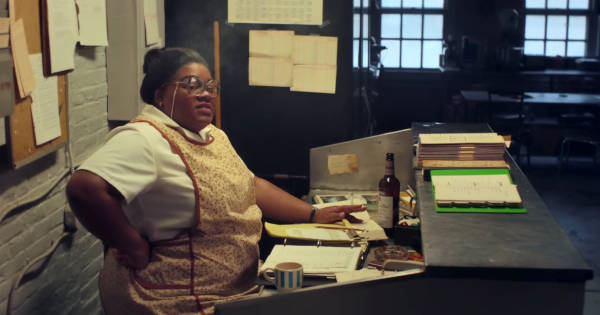
[Da’Vine Joy Randolph in The Holdovers]
I’m not warming up to Robert Downey Jr’s Best Supporting Actor predictions that all the outlets have. I would much rather have given it to the kid in Anatomy of a Fall or Tom Hanks from Asteroid City or even Jaime Fox for They Killed Tyrone (an excellent film that everyone missed because it came out the same day as Barbenheimer). Mark Ruffalo is virtuosic but inconsistent. He does take a call to play a character written as a dandy and a fop, to be instead a brutish manly fellow, which is an interesting take. Sterling K Brown is good, but not Oscar-worthy, because all he’s got is being different from what he usually plays. Robert De Niro plays the cutest old man villain that you’ve ever seen and reminds me a great deal of the lead in Up. I enjoy his coy avuncular perfidy, and just his existence in the film quickens its runtime. This then leaves us with Ryan Gosling winning for Ken, which is crazy I know, and ironic given the plot of Barbie but seems to me the most likely. He wrings out the comedy from places where there is none. So strange, but also deserved. Who am I kidding? This is the category that I’ve probably gone wrong in, but hey for now I’m going to stick with it.
Best Adapted Screenplay is going to be a tough call, with Barbie, Zone of Interest and Poor Things all being strong contenders. I’m going to go with American Fiction taking this away for its consistent heart and startling originality. Best Original Screenplay will probably go to Anatomy of a Fall, with Past Lives being a strong contender. Snubs in these categories include Air and Tetris, both of which are quick-moving, incredibly tightly written films, well worth your time. I would also include Dream Scenario in this, which is a tough film to watch, but an incredible concept, and some very fine acting from Nicholas Cage.

[Nicholas Cage in Dream Scenario]
Best Sound is clearly going to The Zone of Interest because the entire premise of the movie is about the sounds in the background. I haven’t seen Godzilla Minus One, but I think Best Special Effects is going to The Creator, only because they’ve probably re-invented the potential of special effects with an unbelievably low budget. Best Production Design strangely missed Asteroid City, so I guess this will go to Poor Things being technically more creative than Barbie (though Napoleon deserves a shout out). I’d give Best Costume Design to Poor Things for the same reason (original costumes, over replicating costumes from a doll). Best Make Up and Hairstyling will probably go to Maestro for their work on Bradley Cooper to age him up and age him down, and I think that would be deserved.
Best Cinematography is a difficult call between Poor Things and Killers of the Flower Moon. I’m going to give it to Killers of the Flower Moon for superior framing (had Oppenheimer’s camera work not been so inconsistent, it would have gotten it for being a more difficult technical feat). I’ll also mark my surprise as to why The Zone of Interest isn’t in there. Best Editing I’ll also give to long-time editing goddess Thelma Schoonmaker for Killers of the Flower Moon, for the odd choices she’s sometimes made, though I think more people would notice the editing in Oppenheimer which I give minus marks to because even though it’s brilliant in places, it’s also janky in places.
Best Animated Feature should be very very hard. There are a lot of good pictures this year. Elemental would have won it in many other years and is a spunky and emotive film. Nimona is no slouch either, being elegantly animated and quite unpredictable with its zany humour, and trope-breaking narrative. I haven’t seen The Boy and the Heron (not for lack of trying), but come on, it’s Miyazaki. No one can animate wind and wonder like Miyazaki can. Despite all of this I think anything is hard-pressed to take on Spiderman: Across the Spiderverse. It’s full of heart, it breaks new ground in animation and storytelling. It’s Meta-modernist (we’ve covered that before) and it’s got better writing than all the best writing nominees combined. The simplest of dialogue drips with history and subtext. And don’t even get me started on the brilliance of the narrative. I could be wrong, and The Boy and the Heron could be better, but given that most of the people voting on this are from the American Animation voting block, and Across the Spiderverse is jaw-droppingly amazing, I think this has got it wrapped up in silk.
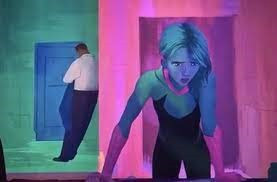
[Across the Spiderverse]
I’ve only seen Teacher’s Lounge and Zone of Interest among the International Features, and I think it’s a no-brainer that Zone of Interest will take this away. Especially odd because it’s a submission from the UK, but it qualifies because it’s mostly in German. France apparently didn’t submit Anatomy of a Fall for political reasons, but that would have made this a hard category to predict.
Even though public opinion feels Oppenheimer will win Best Original Score, I don’t think it should. I know it’s supposed to be mathematical, but it’s full of arpeggios, and consequently it’s not as memorable. It should be a huge, gigantic score in the way Interstellar was. Consequently, I think it’s going to go to Poor Things whose detuned soundtrack was both memorable, contributes to the story and is interesting.
I haven’t watched much of the others, so instead I’ll wrap this long article up, with a final prediction of The Wonderful Story of Henry Sugar winning Best Short Film, because of course, it will.

[The Wonderful Story of Henry Sugar]
Let me know your thoughts. Did you watch these films, and do you think some other best supporting actor is more deserving? From my own part, I’ll see you around next year.

[The Boy and the Heron]
